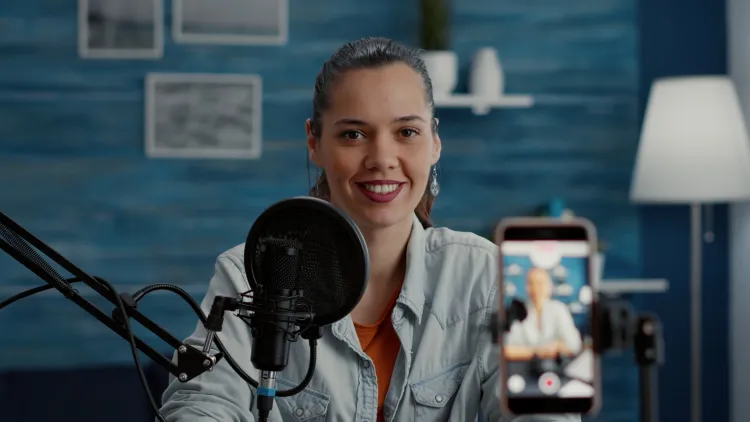Getting your book published is a challenge in itself. And finding a reader base is often even harder.
Traditional approaches to promoting a new book include things like newsletter features, blog posts, paid ads, and publishing to writer-centric websites. But for the most part, these avenues have become fairly saturated. With more than 500 million blogs in existence, it’s hard to stand out from the crowd and get the right people to pay attention.
That’s exactly why increasing numbers of authors are turning to podcasting as their go-to promotional strategy. The cut-through is better, the audiences are more engaged, and most importantly, the sales conversions are higher. So if your goal is to find new readers, getting behind a mic is one of the best ways to start.
There are two main ways you can use podcasting to sell more books:
- Being a guest on other podcasts
- Starting your own podcast
In this article we’ll explain how you can use both approaches to create effective exposure for your books and convert listeners into readers and fans.
The Podcast Boom
Before we get into the specifics of using podcasting to sell books, let’s take a quick look at the numbers. While audience figures for traditional media such as TV and radio continue to slowly decline, podcasts are very much on the come up. According to recent statistics:
- Podcasting awareness has risen dramatically. In 2006, only 22% of consumers knew what a podcast was, but by 2019 over 64% of consumers were aware of podcasting.
- By 2022 it’s estimated podcast listenership figures will grow to 132 million in the US alone.
- Podcast consumers now listen to an average of seven podcast episodes a week. That’s up 40% since 2017.
As an author, you shouldn’t ignore this wide and rapidly growing pool of potential readers. Whatever niche your book caters to, there are listeners out there waiting.
If you’re still in any doubt, consider the long list of authors who have made appearances on shows like The Joe Rogan Experience, The Tim Ferriss Show, and Making Sense with Sam Harris. Big-name non-fiction authors are typically booked on a number of podcasts like these by their publishers following the launch of a new book. And that’s because the publishers know it’s one of the most effective ways to boost sales.
While you might not yet have the credentials to get yourself booked on Joe Rogan, that doesn’t mean there’s no value in podcasting. You don’t need to reach millions of people to be successful. Your target audience are the only people that matter. And thanks to the rich diversity of shows in podcasting’s long tail, you’ll be able to reach them, wherever they are.

Get booked on podcasts the easy way
With more than 70,000 members, MatchMaker.fm is the largest online community connecting podcasters & guests.
Join MatchMaker todayWhy Podcasting is Perfect for Authors
As mentioned before, there are lots of different ways to promote a new book. So what makes podcasting unique? Well, there are two main reasons:
Ease of Consumption
Podcasts are much easier to consume than text-based media and video. To read something, you need to sit still and focus attentively. Watching videos takes less concentration, but you still need to be still. In contrast, podcasts can be easily consumed while multitasking.
Thanks to smartphones, people can listen to podcasts anywhere and everywhere - during their commute, in the gym, while doing housework, or even in bed at night. By guesting on podcasts or creating your own, you’ll make it easier for audiences to connect with your message and familiarize themselves with what your latest book is all about.
Intimacy
This is where podcasting really shines. It allows you to connect with people on a deeper, more personal level. Earbuds transmit voices directly inside the listener's heads, where they rub shoulders with their own thoughts. This creates an effect where it seems like you’re talking directly to them. That can lead to the creation of incredibly strong connections. Many fans identify as “friends” of their favourite podcasters, even if they’ve never met them.
Being a Guest on Other Podcasts
If you’re keen to tap into the power of podcasts, we recommend starting out by being a guest on other podcasts first. It takes a lot less effort than setting up your own podcast, and for authors, it delivers many of the same benefits.
To get started, you need to compile a list of podcasts likely to be a good fit for the subject matter of your book. Closer alignment typically results in more sales. For example, if you’ve written a book about diet and nutrition, it would make sense to focus your efforts on getting booked on health and wellness podcasts. You need to exclusively target the audiences most likely to purchase your book after hearing your interview.
For more on how to promote your book on podcasts, check out the video guide below from MatchMaker.fm and Podcast.co founder, James Mulvany:
Finding Suitable Podcasts on MatchMaker.fm
MatchMaker.fm is an online platform that connects podcasters with guests. So if you’re looking to find suitable podcasts to promote your book on, all it takes is a few clicks.
The first step is to create your guest profile. Simply upload a photo, add your areas of interest, and fill in some basic details about yourself. For more on how to create the perfect guest profile, check out this article.
Once you’ve created your guest profile, then it’s time to search the database of podcasts. There are thousands to choose from, so the quickest way to narrow down your search is to use filters. You can filter shows by podcast category, location, language, and more.
Unless you want to focus on a specific region or country, podcast category is usually the most relevant filter for authors. Simply pick out the categories that most closely align with your book, and browse the available shows.
If you spot any podcasts that look like a good opportunity, you can quickly add them to your favourites by clicking the heart icon on the show profile. We recommend building up a list of 15 - 20 suitable podcasts to begin with. Once you’ve found them, it’s time to pitch yourself as a guest.
How to Write Your Guest Pitch
To get booked, you need to reach out to the hosts on MatchMaker’s instant messaging service and pitch yourself as a guest. To do this, think about what you can bring to the show. This is not just about you selling books, it’s about you adding value to someone else’s product - a podcast they’ve put a lot of time and effort into building.
The hosts of top podcasts often receive multiple guest pitches a day. And they have no obligation to book you simply because you reached out to them. So to stand out and increase your chances of success, your pitch needs to convey the unique value or perspective you can offer listeners. For more on how to craft the perfect podcast guest pitch, check out this guide.
How to Impress Listeners
Getting booked as a guest is great. But the work doesn’t end there. During the interview, you need to wow listeners if you want to convince them to buy your book. And that takes preparation.
Unless you’ve been interviewed hundreds of times before, you can’t just “wing it”. If you go in unprepared, you’re probably going to end up fumbling over words or giving boring generic responses. Remember, you have one chance to impress each audience and make them remember your name. So don’t take it for granted.
Think about the kinds of questions the host is likely to ask you and write them down. Then practice your answers so they’re tight, crisp, and deliver your message clearly. Another handy tip is try to try to work in references to certain chapters or sections of your book during the conversation. For example, you might say:
“In chapter 7 of my book I go into this topic in detail, but in broad terms, the key things to understand about it are…”
Referencing your writing a few times throughout the conversation is good practice. But don’t constantly try to steer the conversation back to your book. It’ll disrupt the natural flow of the interview and audiences generally don’t like it when they feel like someone is trying to sell them something. Be tactful in your approach.
If you impress, a portion of the audience will be keen to learn more. With that in mind, make sure you end each appearance with a clear call-to-action telling listeners exactly where to go to order your book - whether that’s your own website, Amazon, or some other site. Most hosts will be kind enough to tee up this opportunity for you with a question like “Where can people go if they’re interested to learn more?”.
Organising a Podcast Book Tour
If you’ve just launched a new book, or you’re planning to release one soon, a podcast tour is a great way to help secure those crucial early pre-order and sales.
It used to be that authors would travel across the country visiting bookstores as a way to reach multiple markets in record time. Podcast tours get rid of expensive and time-sucking travel. Plus, since podcast interviews are evergreen, audiences will continue to discover you well after your launch.
The premise is simple. Appear on as many relevant podcasts as you can within a given time period (typically 30 days). It obviously takes a lot of work to plan and organise a tour, but using MatchMaker.fm makes things easier. By streamlining the booking process, it allows you to line up a string of appearances with much less hassle.
James Mulvany used the MatchMaker to get himself booked on more than 30 podcasts in 30 days. In the video below, he documents the entire process from start to finish and gives some helpful advice on how to replicate it for yourself.
Starting Your Own Podcast
If you’d like to take things a step further and set up your own podcast, the first question to ask yourself is - why do you want to do it?
If your only answer to that question is simply to ‘sell more books’ and you only plan to discuss your own books on the podcast, you’ll probably want to reconsider. Be honest with yourself. How many people will tune in every single week to hear you talk exclusively about your own books?
With the exception of friends and family, the answer is not many. If you’re only interested in selling books, your time would be better spent making guest appearances on other podcasts. But if you’ve got a valid reason to start your own (and enough free time to dedicate to the process) then it can be a great way to build your brand as an author.
Deciding on a Podcast Format
Consistency is key in podcasting. Listeners like to know what to expect when they hit play on your episodes. So if you talk about golf one week, then rant about politics the next, people will lose interest immediately. You need a common thread that ties all your episodes together, and a format that’s easy to replicate each week.
What your format will look like depends on what your goals are. Below are some simple format ideas for authors to give you some inspiration.
- If your goal is to connect with other authors in your field and build up your network, then it would make sense to produce a show where you interview other authors about their work.
- If your goal is to show off your expertise in an area that relates to your book, then you might want to produce short solo episodes where you riff on a narrowly defined topic each week.
- If your goal is to connect with your existing reader on a deeper level, then you might want to run a Q&A show where you respond to a number of questions submitted by readers each week.
- If your goal is to help other aspiring authors improve their craft, then you might want to create a series of educational episodes that effectively function like a writing workshop.
Of course there are many other formats your show could take. The key is to think carefully about who you’re trying to reach. Once you’ve nailed down your target audience, you can then tailor your podcast to speak directly to them.
How to Get Started
If you’ve come up with a solid concept for your own podcast, you’ll need to get yourself a basic recording set up. You can produce great quality audio relatively cheaply, so there’s no need to break the bank. But there are a few essentials you’ll need to invest in upfront.
Microphone
Given that competition is increasing in the podcast space, you can’t get away with poor sound quality. Internal laptop or smartphone microphones aren’t good enough. Remember, if your audio immediately offends listeners' eardrums, they’re not going to stick around very long!
Fortunately there are loads of great plug-and-go USB microphones on the market. We recommend:
Headphones
Headphones are really important for remote recording. Both you and your guest need to use them to prevent your mics picking up feedback. The quality of your headphones doesn’t matter as much as the quality of your mic, so if you already have a pair of earbuds, feel free to use those.
Headphones also give you more control over the sound so you can make adjustments on the fly. If things sound a bit muffled, move away, or draw the mic closer if your voice sounds distant. Your headphones will also let you know if you’re picking up any ambient background noise.
Editing Software
Your podcast production software will help you record, edit, and mix your episodes together. Here are the two we recommend:
- Audacity: Free, simple, and easy to use from the get go. Audacity is probably the best well rounded audio program for newcomers to record and edit shows on Windows, Mac, and Linux systems. If you’re just getting started, we recommend using Audacity until you become more comfortable with the recording and editing process.
- GarageBand: Exclusively for Mac computers, GarageBand is good enough for most of your audio recording and editing needs.
Hosting Provider
Your podcast host is the place where you’ll upload all your episodes. We recommend Podcast.co as it’s specifically designed to make the process as simple as possible. Features include:
- Drag and drop publishing
- Done-for-you distribution to Apple, Spotify, Google, Amazon and more.
- A customised web page for your podcast
- Marketing tools including transcriptions and audiograms
- Simple and reliable analytics
- And lots more!
Once you’ve got these four essentials, you should be able to put together a professional sounding show that will stand the test of time.
Ready to Record?
The reality is, the merits of your book alone often aren't enough to generate the sales you want. Getting into podcasting, whether as a guest or starting your own, allows you to create marketing content that lives outside your book, increasing your exposure and reach.
Podcasting has transitioned from the fringes of the media landscape to become a staple of the mainstream. Any authors aspiring to build their brand and generate more sales should take note. Create your profile on MatchMaker.fm and book your first podcast guest appearance today.
For more on how to create a guest profile that stands out from the crowd, check out this article.

Get booked on podcasts the easy way
With more than 70,000 members, MatchMaker.fm is the largest online community connecting podcasters & guests.
Join MatchMaker today





